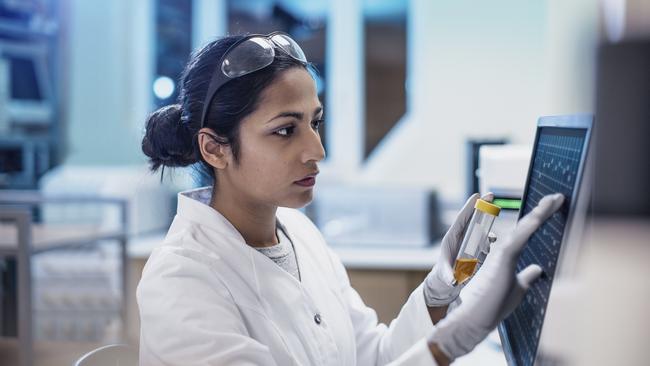Cochlear, CSL applaud move to halve tax rate to keep Australian research in the country
The federal government’s ‘patent box’ will almost halve the tax rate on Australian research that is commercialised locally.

Australia’s biggest biotech companies have welcomed the federal government finally introducing its “patent box” legislation – that will almost halve the corporate tax rate on profits from locally commercialised research – to parliament.
The move involves introducing a concessional tax rate of 17 per cent to shore up local manufacturing and stem the tide of Australian inventions – like Wi-Fi – being commercialised overseas.
Profits on products that are developed and then manufactured in Australia would be taxed at the concessional rate. This compares with the usual corporate tax rate of 30 per cent for big businesses and 25 per cent for smaller operators.
Australia’s biggest health company CSL and hearing implant giant Cochlear said the “patent box” – which was flagged in the 2021-22 federal budget – would make the country more competitive with the UK, Switzerland and Singapore.
Cochlear chief executive Dig Howitt said while Australia had an “outstanding record in medical research”, its “record in commercialising that research is not as strong”.
He said the “patent box” legislation, which was introduced to parliament on Thursday, would incentivise medical and biotechnology companies of all sizes to keep their intellectual property and manufacturing in Australia, creating “economic benefits for all Australians through jobs, capital investment and tax revenues”.
“The “patent box” legislation makes Australia a more competitive country to commercialise research, which will create local jobs and build our sovereign capability in medical products manufacturing,” Mr Howitt said.
“Market based incentives like the “patent box” will be an important building block in any successful strategy to keep world leading medical and biotech companies in Australia. It will also make investment in newer companies more attractive, enabling the development of new globally competitive medical and biotechnology companies here in Australia.
“We hope to see the legislation passed as soon as possible and look forward to the government closely engaging with our sectors in implementing this very important legislation.”
Mr Howitt has long called for an overhaul of the tax system. At the onset of the Covid-19 pandemic he said skills and productivity gains are the only way Australians are ever going to repay hundred of billions of dollars in government debt and he has identified three areas ripe for reform.
No. 1 was an overhaul of the tax system, followed by reforming the industrial relations regime and the education sector to increase productivity and create more jobs.
“For any economy to pay off the debt there has got to be productivity gains and really thinking about what is Australia really good at and how can we be a competitive economy that can support job creation and high paying jobs,” Mr Howitt said at the time.
“That involves a review of the tax system, regulation and ensuring that we have a strong education system at all levels, and we want to ensure Australia is a country where we can create and commercialise intellectual property and retain it in Australia, and all the jobs that go along with that.”
More than 20 countries around the world, including the UK, Switzerland, France and Belgium, offer similar targeted incentives to the “patent box”.
The government said: “when a company develops a patent in Australia, it can choose to commercialise the patent by licencing the use of the patent to Australian or overseas manufacturers”.
“The “patent box” regime is intended to incentivise the company to commercialise the patent onshore in Australia by providing a concessional CIT rate for the corporate income generated from the patent”.
It expects bigger companies to benefit from the initiative, which gets its name from the box on an income tax form that businesses check if they qualify. The government highlighted data from the UK, which showed more than 95 per cent of the tax relief claimed under the UK’s “patent box” regime came from large companies rather than smaller enterprises in 206-17.
CSL chief executive Paul Perreault said last year the “patent box” initiative was a good move that would bring broad benefits, such as making the country better prepared for future pandemics.
“It allows Australia to become more competitive when it comes to countries like the UK, Switzerland, Singapore and others that are trying to stimulate this investment,” Mr Perreault said.
“A crisis does help to breed trailblazers and ingenuity and accelerate the solutions to treat and prevent things like Covid-19 and future pandemics.
Mr Perreault also called for a greater private and public focus on continual investment in innovation, starting with educational systems and STEM programs right through removal of red tape so investment in science was sustained rather than a mid-pandemic kickstart.
“The economic reasons for investing in science can’t be ignored,” he said.
Brett Sandercock, chief financial officer at sleep apnea and respiratory company ResMed, said the pandemic had underlined the need to support local manufacturing.
“We’re pleased to see a formal patent box proposal today designed to encourage investment in Australian medical research and innovation. The pandemic has reminded us the value of strengthening capabilities to locally design and build medical technology, such as life-saving ventilators that ResMed builds in Northwest Sydney,” Mr Sandercock said.
“A sustained and growing Australian medical science industry requires a strongly supported ecosystem of scientists and engineers dedicated to improving healthcare and the lives of others.
“A patent box can help ensure that the entire industry of advanced medical technology and advanced manufacturing grows strong in Australia. ResMed was founded in Australia, and we want to see this country thrive as one of the best places in the world to do business.”








To join the conversation, please log in. Don't have an account? Register
Join the conversation, you are commenting as Logout